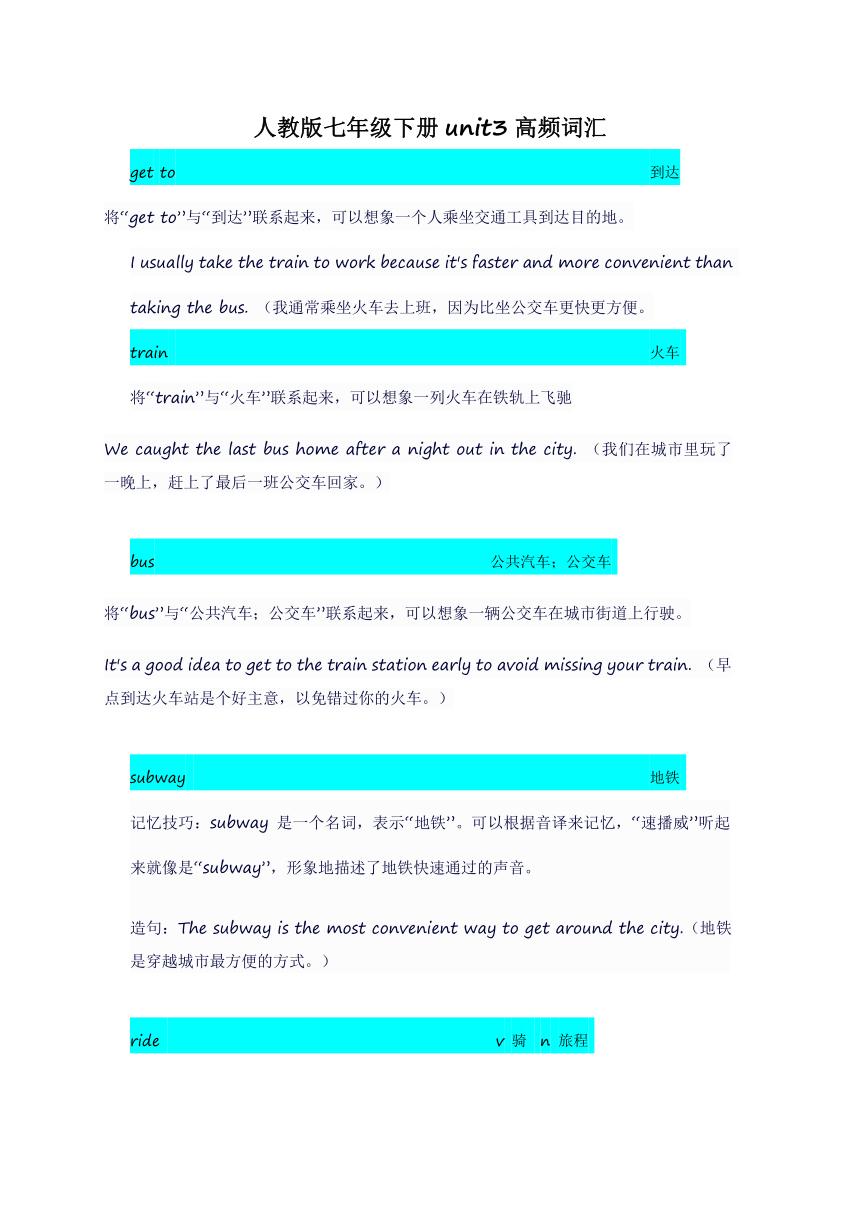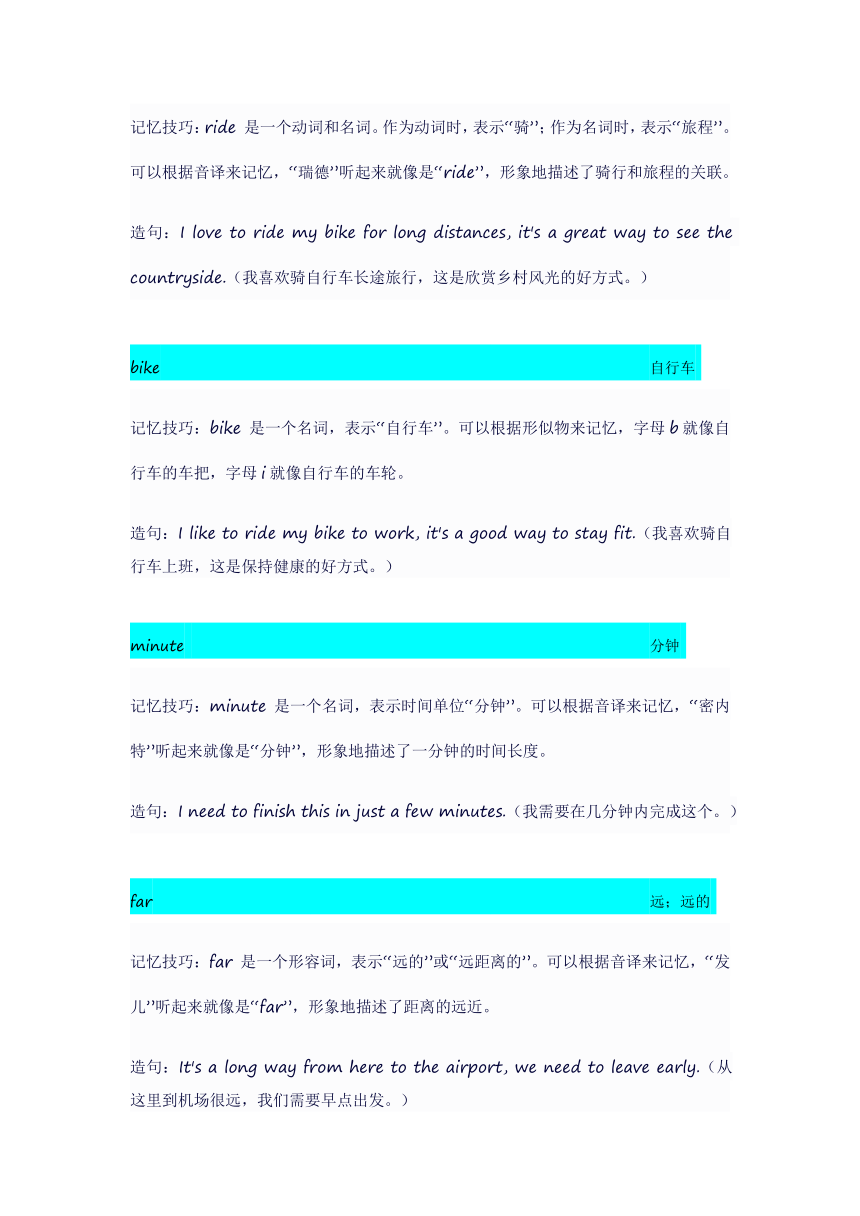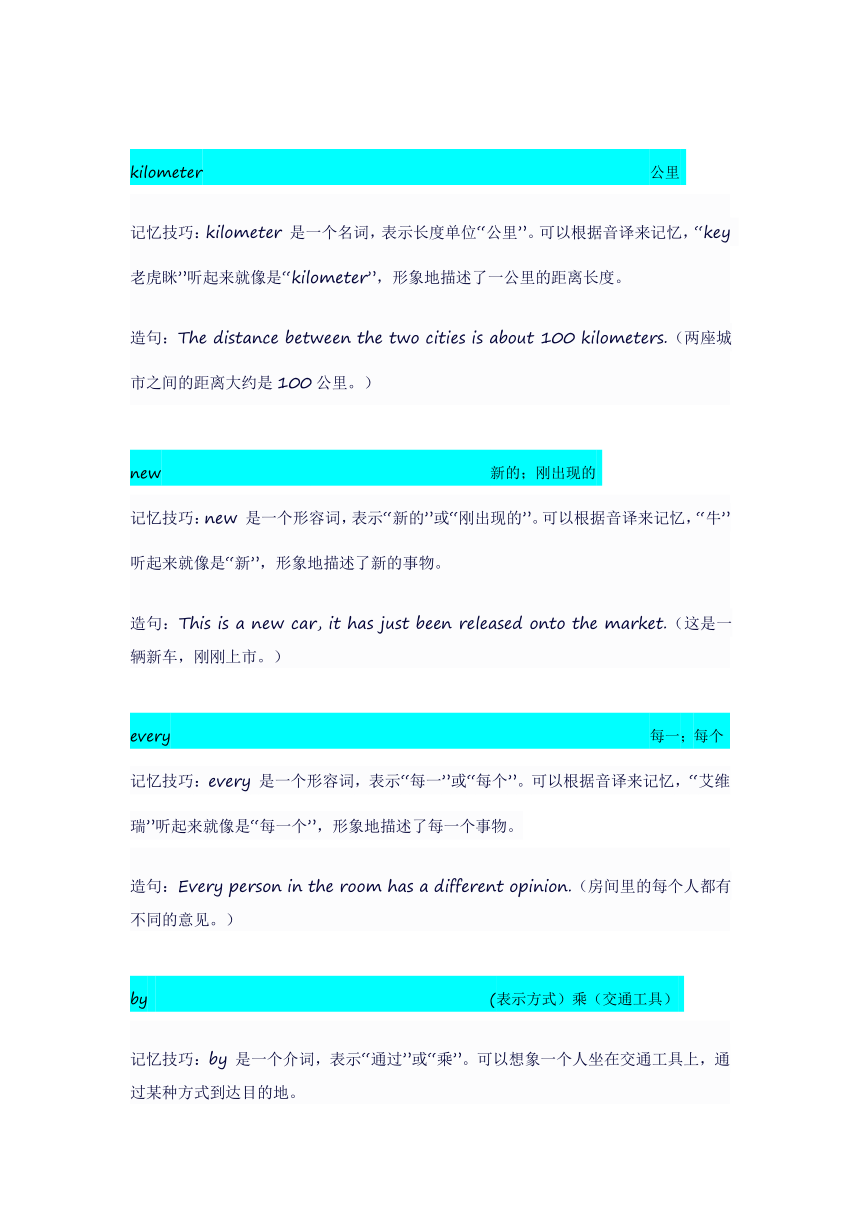Unit 3 Is this your pencil? 高频词汇
文档属性
| 名称 | Unit 3 Is this your pencil? 高频词汇 |

|
|
| 格式 | docx | ||
| 文件大小 | 23.0KB | ||
| 资源类型 | 教案 | ||
| 版本资源 | 人教新目标(Go for it)版 | ||
| 科目 | 英语 | ||
| 更新时间 | 2024-01-16 00:00:00 | ||
图片预览




文档简介
人教版七年级下册unit3高频词汇
get to 到达
将“get to”与“到达”联系起来,可以想象一个人乘坐交通工具到达目的地。
I usually take the train to work because it's faster and more convenient than taking the bus. (我通常乘坐火车去上班,因为比坐公交车更快更方便。
train 火车
将“train”与“火车”联系起来,可以想象一列火车在铁轨上飞驰
We caught the last bus home after a night out in the city. (我们在城市里玩了一晚上,赶上了最后一班公交车回家。)
bus 公共汽车;公交车
将“bus”与“公共汽车;公交车”联系起来,可以想象一辆公交车在城市街道上行驶。
It's a good idea to get to the train station early to avoid missing your train. (早点到达火车站是个好主意,以免错过你的火车。)
subway 地铁
记忆技巧:subway 是一个名词,表示“地铁”。可以根据音译来记忆,“速播威”听起来就像是“subway”,形象地描述了地铁快速通过的声音。
造句:The subway is the most convenient way to get around the city.(地铁是穿越城市最方便的方式。)
ride v 骑 n 旅程
记忆技巧:ride 是一个动词和名词。作为动词时,表示“骑”;作为名词时,表示“旅程”。可以根据音译来记忆,“瑞德”听起来就像是“ride”,形象地描述了骑行和旅程的关联。
造句:I love to ride my bike for long distances, it's a great way to see the countryside.(我喜欢骑自行车长途旅行,这是欣赏乡村风光的好方式。)
bike 自行车
记忆技巧:bike 是一个名词,表示“自行车”。可以根据形似物来记忆,字母b就像自行车的车把,字母i就像自行车的车轮。
造句:I like to ride my bike to work, it's a good way to stay fit.(我喜欢骑自行车上班,这是保持健康的好方式。)
minute 分钟
记忆技巧:minute 是一个名词,表示时间单位“分钟”。可以根据音译来记忆,“密内特”听起来就像是“分钟”,形象地描述了一分钟的时间长度。
造句:I need to finish this in just a few minutes.(我需要在几分钟内完成这个。)
far 远;远的
记忆技巧:far 是一个形容词,表示“远的”或“远距离的”。可以根据音译来记忆,“发儿”听起来就像是“far”,形象地描述了距离的远近。
造句:It's a long way from here to the airport, we need to leave early.(从这里到机场很远,我们需要早点出发。)
kilometer 公里
记忆技巧:kilometer 是一个名词,表示长度单位“公里”。可以根据音译来记忆,“key 老虎眯”听起来就像是“kilometer”,形象地描述了一公里的距离长度。
造句:The distance between the two cities is about 100 kilometers.(两座城市之间的距离大约是100公里。)
new 新的;刚出现的
记忆技巧:new 是一个形容词,表示“新的”或“刚出现的”。可以根据音译来记忆,“牛”听起来就像是“新”,形象地描述了新的事物。
造句:This is a new car, it has just been released onto the market.(这是一辆新车,刚刚上市。)
every 每一;每个
记忆技巧:every 是一个形容词,表示“每一”或“每个”。可以根据音译来记忆,“艾维瑞”听起来就像是“每一个”,形象地描述了每一个事物。
造句:Every person in the room has a different opinion.(房间里的每个人都有不同的意见。)
by (表示方式)乘(交通工具)
记忆技巧:by 是一个介词,表示“通过”或“乘”。可以想象一个人坐在交通工具上,通过某种方式到达目的地。
造句:I usually take the bus to work by getting on at the main stop.(我通常在主站上车,乘坐公交车去上班。)
drive 开车
记忆技巧:drive 是一个动词,表示“驾驶”或“开车”。可以想象一个人坐在驾驶座上,手握方向盘,驾驶汽车前进。
造句:I drive to work every day, it's the most convenient way to get there.(我每天开车上班,这是最方便的到达方式。)
car 小汽车;轿车
记忆技巧:car 是一个名词,表示“小汽车”或“轿车”。可以根据形似物来记忆,字母c就像一个车轮的形状。
造句:I like to drive my car on the open highway, it's a great feeling.(我喜欢在高速公路上驾驶我的车,感觉很棒。)
live 居住;生活
记忆技巧:live 是一个动词,表示“居住”或“生活”。可以想象一个人在某个地方住下来,过着生活。
造句:I live in the city and work in the suburbs, it's a long commute every day.(我住在城市里,在郊区工作,每天上下班路程很长。)
stop n.车站;v 停止
记忆技巧:stop 是一个名词和动词。作为名词时,表示“车站”;作为动词时,表示“停止”。可以想象一个人在车站停下等车,或者在某个地方停下来。
造句:I always have to catch the last bus stop or I won't be able to get home.(我总是得赶最后一班车,否则就回不了家了。)
cross 横过;越过
记忆技巧:cross 是一个动词,表示“横过”或“越过”,可以想象一个十字路口,从一条路走到另一条路,需要“横过”或“越过”马路。
造句:I need to cross the street to get to the other side.(我需要横穿马路到达对面。)
river 河;江
记忆技巧:river 是一个名词,表示“河”或“江”。可以根据音译来记忆,“里尔”听起来就像是河流的哗哗声,形象地描述了河的流淌状态。
造句:The river is running fast and the current is strong.(河水流得很快,水流很急。)
many 许多
记忆技巧:many 是一个形容词,表示“许多”的意思。可以根据音译来记忆,“卖泥”听起来就像是“许多泥”,形象地描述了泥的数量很多。
造句:There are many apples on the tree.(树上有很多苹果。)
Village 村庄;村镇
记忆技巧:Village 是一个名词,表示“村庄”或“村镇”。可以根据音译来记忆,“威立安吉”听起来就像是“威武的村庄”,形象地描述了一个强大而美丽的村庄。
造句:The village is small and quaint, with only a few houses and a church.(这个村庄很小,很古朴,只有几座房子和一座教堂。)
between 介于……之间
记忆技巧:between 是一个介词,表示“在……之间”或“介于……之间”。可以想象在两个物体或事物之间的空间。
造句:The book is between the two chairs.(书在两把椅子之间。)
bridge 桥
记忆技巧:bridge 是一个名词,表示“桥”的意思。可以根据形似物来记忆,字母b就像一座拱桥的形状。
造句:The bridge is strong and sturdy, able to withstand heavy loads.(这座桥很坚固,能够承受重载。)
boat 小船
记忆技巧:boat 是一个名词,表示“小船”的意思。可以根据形似物来记忆,字母b就像一艘小船的形状。
造句:We took a boat trip on the river and saw many beautiful sceneries.(我们乘船在河上旅行,看到了许多美丽的风景。)
ropeway 索道
记忆技巧:ropeway 是一个名词,表示“索道”的意思。可以根据形似物来记忆,字母r就像索道的一个支撑点。
造句:The ropeway is a convenient way to get to the top of the mountain.(索道是到达山顶的便捷方式。)
year 年;岁
解析:year 是一个名词,表示时间单位“年”或“岁数”。
造句:I will be 20 years old this year.(今年我就20岁了。)
afraid 害怕;惧怕
解析:afraid 是一个形容词,表示“害怕的”或“惧怕的”。
造句:I am afraid of the dark.(我害怕黑暗。)
like 像
解析:like 是一个介词,表示“像”或“如同”。
造句:He looks like his father.(他长得像他的父亲。)
leave 离开
解析:leave 是一个动词,表示“离开”的动作。
造句:I need to leave now, I have an appointment at 10 o'clock.(我现在需要离开,我十点有个约会。)
dream n 梦想;睡梦 v 做梦
解析:dream 是一个名词和动词。作为名词时,表示“梦想”或“睡梦”;作为动词时,表示“做梦”。
造句:I have a dream that one day I will become a doctor.(我有一个梦想,那就是有一天我能成为一名医生。)
get to 到达
将“get to”与“到达”联系起来,可以想象一个人乘坐交通工具到达目的地。
I usually take the train to work because it's faster and more convenient than taking the bus. (我通常乘坐火车去上班,因为比坐公交车更快更方便。
train 火车
将“train”与“火车”联系起来,可以想象一列火车在铁轨上飞驰
We caught the last bus home after a night out in the city. (我们在城市里玩了一晚上,赶上了最后一班公交车回家。)
bus 公共汽车;公交车
将“bus”与“公共汽车;公交车”联系起来,可以想象一辆公交车在城市街道上行驶。
It's a good idea to get to the train station early to avoid missing your train. (早点到达火车站是个好主意,以免错过你的火车。)
subway 地铁
记忆技巧:subway 是一个名词,表示“地铁”。可以根据音译来记忆,“速播威”听起来就像是“subway”,形象地描述了地铁快速通过的声音。
造句:The subway is the most convenient way to get around the city.(地铁是穿越城市最方便的方式。)
ride v 骑 n 旅程
记忆技巧:ride 是一个动词和名词。作为动词时,表示“骑”;作为名词时,表示“旅程”。可以根据音译来记忆,“瑞德”听起来就像是“ride”,形象地描述了骑行和旅程的关联。
造句:I love to ride my bike for long distances, it's a great way to see the countryside.(我喜欢骑自行车长途旅行,这是欣赏乡村风光的好方式。)
bike 自行车
记忆技巧:bike 是一个名词,表示“自行车”。可以根据形似物来记忆,字母b就像自行车的车把,字母i就像自行车的车轮。
造句:I like to ride my bike to work, it's a good way to stay fit.(我喜欢骑自行车上班,这是保持健康的好方式。)
minute 分钟
记忆技巧:minute 是一个名词,表示时间单位“分钟”。可以根据音译来记忆,“密内特”听起来就像是“分钟”,形象地描述了一分钟的时间长度。
造句:I need to finish this in just a few minutes.(我需要在几分钟内完成这个。)
far 远;远的
记忆技巧:far 是一个形容词,表示“远的”或“远距离的”。可以根据音译来记忆,“发儿”听起来就像是“far”,形象地描述了距离的远近。
造句:It's a long way from here to the airport, we need to leave early.(从这里到机场很远,我们需要早点出发。)
kilometer 公里
记忆技巧:kilometer 是一个名词,表示长度单位“公里”。可以根据音译来记忆,“key 老虎眯”听起来就像是“kilometer”,形象地描述了一公里的距离长度。
造句:The distance between the two cities is about 100 kilometers.(两座城市之间的距离大约是100公里。)
new 新的;刚出现的
记忆技巧:new 是一个形容词,表示“新的”或“刚出现的”。可以根据音译来记忆,“牛”听起来就像是“新”,形象地描述了新的事物。
造句:This is a new car, it has just been released onto the market.(这是一辆新车,刚刚上市。)
every 每一;每个
记忆技巧:every 是一个形容词,表示“每一”或“每个”。可以根据音译来记忆,“艾维瑞”听起来就像是“每一个”,形象地描述了每一个事物。
造句:Every person in the room has a different opinion.(房间里的每个人都有不同的意见。)
by (表示方式)乘(交通工具)
记忆技巧:by 是一个介词,表示“通过”或“乘”。可以想象一个人坐在交通工具上,通过某种方式到达目的地。
造句:I usually take the bus to work by getting on at the main stop.(我通常在主站上车,乘坐公交车去上班。)
drive 开车
记忆技巧:drive 是一个动词,表示“驾驶”或“开车”。可以想象一个人坐在驾驶座上,手握方向盘,驾驶汽车前进。
造句:I drive to work every day, it's the most convenient way to get there.(我每天开车上班,这是最方便的到达方式。)
car 小汽车;轿车
记忆技巧:car 是一个名词,表示“小汽车”或“轿车”。可以根据形似物来记忆,字母c就像一个车轮的形状。
造句:I like to drive my car on the open highway, it's a great feeling.(我喜欢在高速公路上驾驶我的车,感觉很棒。)
live 居住;生活
记忆技巧:live 是一个动词,表示“居住”或“生活”。可以想象一个人在某个地方住下来,过着生活。
造句:I live in the city and work in the suburbs, it's a long commute every day.(我住在城市里,在郊区工作,每天上下班路程很长。)
stop n.车站;v 停止
记忆技巧:stop 是一个名词和动词。作为名词时,表示“车站”;作为动词时,表示“停止”。可以想象一个人在车站停下等车,或者在某个地方停下来。
造句:I always have to catch the last bus stop or I won't be able to get home.(我总是得赶最后一班车,否则就回不了家了。)
cross 横过;越过
记忆技巧:cross 是一个动词,表示“横过”或“越过”,可以想象一个十字路口,从一条路走到另一条路,需要“横过”或“越过”马路。
造句:I need to cross the street to get to the other side.(我需要横穿马路到达对面。)
river 河;江
记忆技巧:river 是一个名词,表示“河”或“江”。可以根据音译来记忆,“里尔”听起来就像是河流的哗哗声,形象地描述了河的流淌状态。
造句:The river is running fast and the current is strong.(河水流得很快,水流很急。)
many 许多
记忆技巧:many 是一个形容词,表示“许多”的意思。可以根据音译来记忆,“卖泥”听起来就像是“许多泥”,形象地描述了泥的数量很多。
造句:There are many apples on the tree.(树上有很多苹果。)
Village 村庄;村镇
记忆技巧:Village 是一个名词,表示“村庄”或“村镇”。可以根据音译来记忆,“威立安吉”听起来就像是“威武的村庄”,形象地描述了一个强大而美丽的村庄。
造句:The village is small and quaint, with only a few houses and a church.(这个村庄很小,很古朴,只有几座房子和一座教堂。)
between 介于……之间
记忆技巧:between 是一个介词,表示“在……之间”或“介于……之间”。可以想象在两个物体或事物之间的空间。
造句:The book is between the two chairs.(书在两把椅子之间。)
bridge 桥
记忆技巧:bridge 是一个名词,表示“桥”的意思。可以根据形似物来记忆,字母b就像一座拱桥的形状。
造句:The bridge is strong and sturdy, able to withstand heavy loads.(这座桥很坚固,能够承受重载。)
boat 小船
记忆技巧:boat 是一个名词,表示“小船”的意思。可以根据形似物来记忆,字母b就像一艘小船的形状。
造句:We took a boat trip on the river and saw many beautiful sceneries.(我们乘船在河上旅行,看到了许多美丽的风景。)
ropeway 索道
记忆技巧:ropeway 是一个名词,表示“索道”的意思。可以根据形似物来记忆,字母r就像索道的一个支撑点。
造句:The ropeway is a convenient way to get to the top of the mountain.(索道是到达山顶的便捷方式。)
year 年;岁
解析:year 是一个名词,表示时间单位“年”或“岁数”。
造句:I will be 20 years old this year.(今年我就20岁了。)
afraid 害怕;惧怕
解析:afraid 是一个形容词,表示“害怕的”或“惧怕的”。
造句:I am afraid of the dark.(我害怕黑暗。)
like 像
解析:like 是一个介词,表示“像”或“如同”。
造句:He looks like his father.(他长得像他的父亲。)
leave 离开
解析:leave 是一个动词,表示“离开”的动作。
造句:I need to leave now, I have an appointment at 10 o'clock.(我现在需要离开,我十点有个约会。)
dream n 梦想;睡梦 v 做梦
解析:dream 是一个名词和动词。作为名词时,表示“梦想”或“睡梦”;作为动词时,表示“做梦”。
造句:I have a dream that one day I will become a doctor.(我有一个梦想,那就是有一天我能成为一名医生。)
同课章节目录
- starters 预备篇(2012秋审查)
- Unit 1 Good morning !
- Unit 2 What’s this in English?
- Unit 3 What color is it ?
- Unit 1 My name's Gina.
- Section A
- Section B
- Unit 2 This is my sister.
- Section A
- Section B
- Unit 3 Is this your pencil?
- Section A
- Section B
- Unit 4 Where's my schoolbag?
- Section A
- Section B
- Unit 5 Do you have a soccer ball?
- Section A
- Section B
- Unit 6 Do you like bananas?
- Section A
- Section B
- Unit 7 How much are these socks?
- Section A
- Section B
- Unit 8 When is your birthday?
- Section A
- Section B
- Unit 9 My favorite subject is science.
- Section A
- Section B
